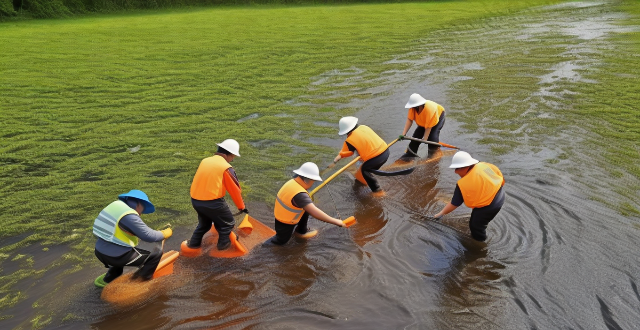Effective strategies for managing water resources during droughts include rainwater harvesting, water conservation, reusing wastewater, and public awareness campaigns. Rainwater harvesting helps reduce dependence on groundwater and surface water sources, while water conservation practices such as fixing leaks and using low-flow fixtures can significantly reduce water consumption. Reusing treated wastewater for non-potable purposes also helps conserve freshwater sources. Public awareness campaigns play a crucial role in educating people about the importance of water conservation and encouraging them to adopt efficient practices and technologies. By adopting these strategies, we can minimize the impact of droughts on people, agriculture, and the environment while ensuring sustainable water management for future generations.

Effective Strategies for Managing Water Resources During Droughts
Introduction
Drought is a natural disaster that can have severe consequences on water resources. It is essential to manage water resources effectively during droughts to minimize the impact on people, agriculture, and the environment. In this article, we will discuss some of the most effective strategies for managing water resources during droughts.
1. Rainwater Harvesting
Rainwater harvesting is an effective strategy for managing water resources during droughts. It involves collecting rainwater from rooftops, driveways, and other surfaces and storing it for future use. This strategy helps to reduce the demand for groundwater and surface water sources, which are often depleted during droughts.
Benefits of Rainwater Harvesting
- Reduced dependence on groundwater and surface water sources: By harvesting rainwater, you can reduce your reliance on groundwater and surface water sources, which are often depleted during droughts.
- Improved water quality: Rainwater is generally free from contaminants such as salts, minerals, and chemicals found in groundwater and surface water sources.
- Cost-effective: Rainwater harvesting systems are relatively inexpensive to install and maintain compared to other water management strategies.
2. Water Conservation
Water conservation is another effective strategy for managing water resources during droughts. It involves reducing water consumption by adopting efficient practices and technologies.
Examples of Water Conservation Practices
- Fixing leaks: Leaks can waste a significant amount of water over time. Fixing leaks in pipes, faucets, and toilets can help conserve water.
- Low-flow fixtures: Installing low-flow showerheads, faucets, and toilets can reduce water consumption without sacrificing performance.
- Efficient irrigation: Using drip irrigation or sprinkler systems with timers can help reduce water waste in agriculture and landscaping.
3. Reusing Wastewater
Reusing wastewater is another effective strategy for managing water resources during droughts. It involves treating wastewater from households, industries, and agricultural activities and using it for non-potable purposes such as irrigation, industrial processes, and toilet flushing.
Benefits of Wastewater Reuse
- Reduced demand for freshwater: By reusing wastewater, you can reduce the demand for freshwater sources, which are often depleted during droughts.
- Improved water quality: Treated wastewater is generally free from harmful contaminants, making it safe for non-potable purposes.
- Cost-effective: Wastewater treatment facilities are relatively inexpensive to build and operate compared to other water management strategies.
4. Public Awareness Campaigns
Public awareness campaigns are crucial for managing water resources during droughts. They involve educating people about the importance of water conservation and encouraging them to adopt efficient practices and technologies.
Examples of Public Awareness Campaigns
- Social media campaigns: Social media platforms can be used to spread awareness about water conservation practices and technologies among a wide audience.
- School programs: School programs can teach children about the importance of water conservation and encourage them to adopt efficient practices at home.
- Community events: Community events such as workshops, seminars, and exhibitions can help raise awareness about water conservation among local residents.
Conclusion
Managing water resources during droughts requires a combination of effective strategies such as rainwater harvesting, water conservation, wastewater reuse, and public awareness campaigns. By adopting these strategies, we can minimize the impact of droughts on people, agriculture, and the environment while ensuring sustainable water management for future generations.